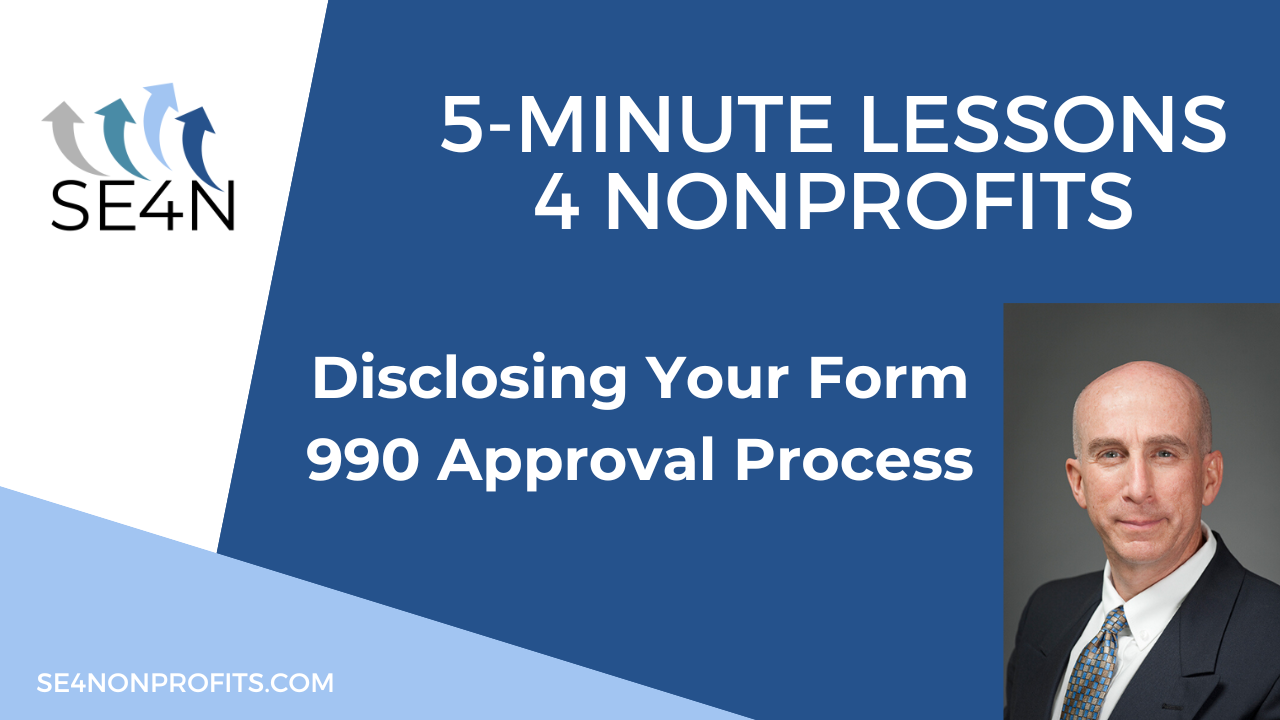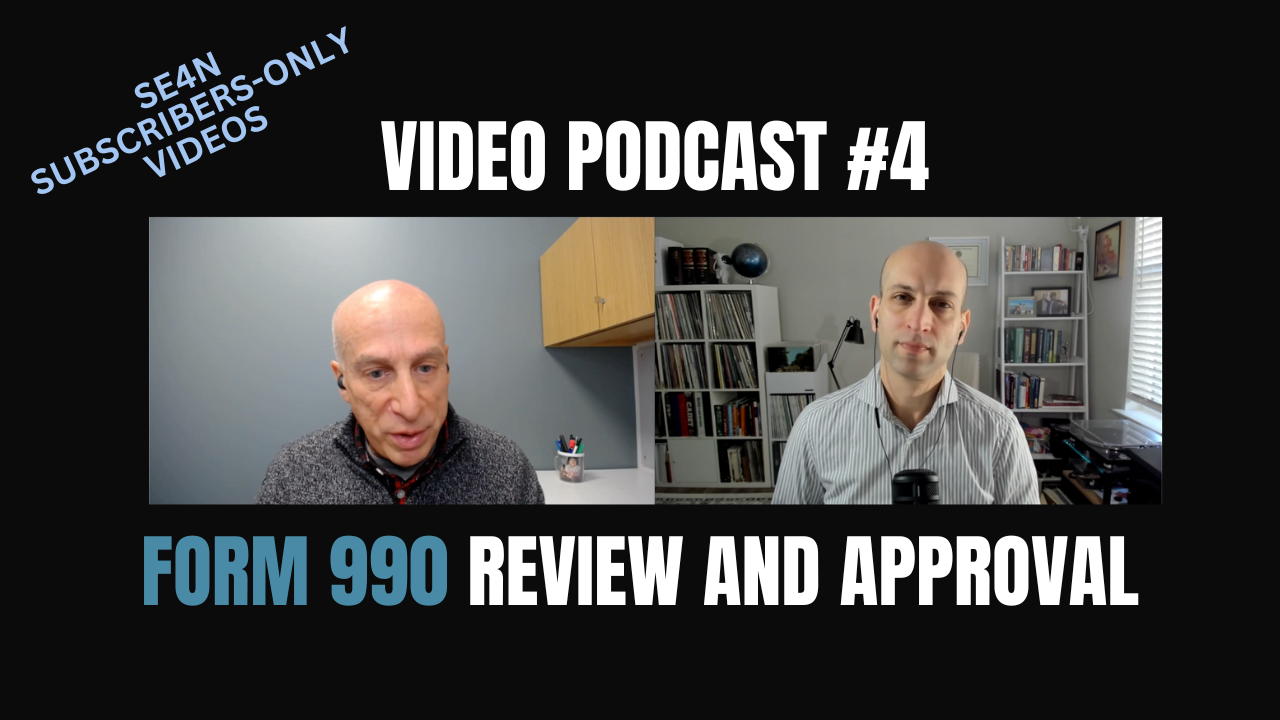
Blog.
Most Recent Posts

Q&A #174 – Are past due Forms 990-N required to be filed for retroactive reinstatement of tax-exempt status?
Internal Revenue Service (IRS) Revenue Procedure 2014-11 describes the process for reinstatement of tax-exempt status that has been automatically revoked for failure to file annual tax filings. Under this guidance, it is not entirely clear whether the Section 5 and Section 6 retroactive reinstatement processes require filing past due Forms 990-N. However, there are strong arguments that filing Forms 990-N for prior years should not be required under any of the retroactive reinstatement processes.

VIDEO Q&A for Subscribers: February 2025
Ben and Mike answer questions from subscribers about how to navigate a financial environment in which grand funding is uncertain, whether people under 18 years old can serve on a nonprofit Board of Directors, whether membership dues are treated as donations or fees for services, and whether a last-minute item can be added to the Board meeting agenda.

VIDEO Q&A for Subscribers: December 2024
Ben and Mike answer questions from subscribers about implementing a CEO / Executive Director succession or transition plan, how to handle errors in an already-filed Form 990, planning for the possible loss in grant funding or a change in funding sources, and whether a person can old two officer positions simultaneously.
![VIDEO Q&A for Subscribers: November 2024 [PREVIEW]](https://images.squarespace-cdn.com/content/v1/5e6ccadfb4659c1d51df14d5/baccfbcd-ed95-49ed-b154-0bfec7efbc71/SE4N+Video+Q%26A+2024-11.png)
VIDEO Q&A for Subscribers: November 2024 [PREVIEW]
Ben and Mike answer questions from subscribers about the spending of operating reserves, conflicts of interest related founders of a nonprofit becoming staff, deciding between filing the Form 990-EZ and the Form 990, and legal issues raised by the moving of funds between related organizations.

Q&A #168 – Is a newly formed nonprofit required to file Form 990-N for its first short tax year?
Most nonprofit organizations are required to submit a federal tax filing for their first partial or short tax year even if their tax-exempt status has not yet been approved, but there is no monetary penalty for failure to file if the organization qualifies to file the Form 990-N (e-postcard). Nonetheless, it is usually prudent to file Form 990-N for the first tax year anyway.

VIDEO: Disclosing Your Form 990 Approval Process | 5-Minute Lessons 4 Nonprofits
SE4N's A. Michael Gellman provides a short lesson on how to approach answering the questions about your nonprofit organization’s Form 990 review and approval process on Lines 11a and 11b on page 6 of the Form 990, Part VI, Section B, including a discussion of some of the various ways to distribute the final draft of the Form 990 to the Board before filing, which Schedule O disclosures are needed, and the importance of setting procedures and providing a clear timeline to the Board.

VIDEO PODCAST: Improving your Form 990 Review Process
Mike and Ben discuss the process of reviewing and approving drafts of Form 990, the steps nonprofit organizations can take to improve their Form 990 review and approval process, the importance of getting input from both financial and non-financial perspectives, how to approach the questions on page 6, Part VI, Lines 11a and 11b of the Form 990, and more.

Establishing a Form 990 Review and Approval Process
Many nonprofit organizations treat the annual Form 990 filing like a sprint at the end of a long 5K race. After the year is completed and the audited financial statements finally appear, the rush to get the Form 990 assembled and filed too often becomes a hectic “mad dash.” Formalizing the process for review and final approval of the Form 990 before filing will help to avoid mistakes, better reflect current conditions, and show the organization in the best possible light.

VIDEO: What is an Unusual Grant? | Nonprofit Glossary
SE4N's Benjamin Takis provides a short summary of the term “unusual grant” and how this concept affects a 501(c)(3) nonprofit organization’s ability to pass the public support tests on Form 990 Schedule A, and avoid being tipped into private foundation status.

Q&A #152 – What happens if a 501(c)(3) public charity exceeds the 501(h) lobbying limits?
501(c)(3) public charities are permitted to engage in “lobbying” up to certain limits. Organizations that make the “501(h) election” are subject to a more concrete set of limits based solely on expenditures made by the organization for lobbying purposes. If an organization exceeds these limits in any one tax year it will have to pay a 25% tax on the excess. A 501(h)-electing organization’s tax-exempt status will not be revoked unless its lobbying expenditures exceed 150% of the limits over a 4-year period.

Q&A #151 – Who should nonprofits name as their principal officer at the top of the Form 990?
The Form 990 instructions state that for purposes of Item F at the heading of the Form 990, the “principal officer” is the person who “regardless of title, has ultimate responsibility for implementing the decisions of the organization's governing body, or for supervising the management, administration, or operation of the organization.” Application of this definition will vary depending on the organization, and this will not necessarily be the same officer who signs the Form 990 at the bottom of page 1.

VIDEO: Describing Your Mission in the Form 990 | 5-Minute Lessons 4 Nonprofits
SE4N's A. Michael Gellman provides a short lesson on how to approach drafting a nonprofit organization's mission statement and description for the three different parts of the Form 990.

Q&A #140 – How do nonprofits report a name change to the IRS?
A formal name change must be reported on the organization’s next Form 990 or 990-EZ by checking the “name change” box in Column B on the left side at the top of page 1 and including a state-certified copy of the amendment to the organization’s Articles of Incorporation. Form 990-N filers must instead send a letter or fax with this supporting documentation to the IRS Exempt Organizations Division.

Q&A #138 – How do nonprofits report a change of address to the IRS?
Nonprofits may, but are not required to, report a change of address to the IRS on Form 8822-B. Alternatively, a change of address may be reported on the organization’s next Form 990 by checking the “address change” box in Column B on the left side at the top of page 1.

Q&A #137 – Is an amended Form 990 required to correct a minor error or omission?
Tax-exempt, nonprofit organizations are required by law to file Forms 990 that are complete and correct, but there is no affirmative legal duty to file an amended Form 990 to correct a newly discovered error or omission. While an organization may wish to file an amended Form 990 to manage public perception, show transparency, or mitigate the risk of penalties, this step may not be worth the cost and effort in the case of an inadvertent good-faith mistake like the omission of a single, volunteer Board member.